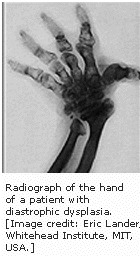
Diastrophic dysplasia (DTD) is a rare growth disorder in which patients are usually short, have club feet, and have malformed handsmand joints. Although found in all populations, it is particularly prevalent in Finland.
The gene whose mutation results in DTD maps to chromosome 5 and encodes a novel sulfate transporter. This ties in with the observation of unusual concentrations of sulfate in various tissues of DTD patients. Sulfate is important for skeletal joints because cartilage—the shock-absorber of joints—requires sulfur during its manufacture. Adding sulfur increases the negative charge within cartilage, which contributes to its shock-absorbing properties.
A great deal of further research must be done before this condition is fully understood and effective therapies are developed.
Publication Details
Copyright
Publisher
National Center for Biotechnology Information (US), Bethesda (MD)
NLM Citation
National Center for Biotechnology Information (US). Genes and Disease [Internet]. Bethesda (MD): National Center for Biotechnology Information (US); 1998-. Diastrophic dysplasia.